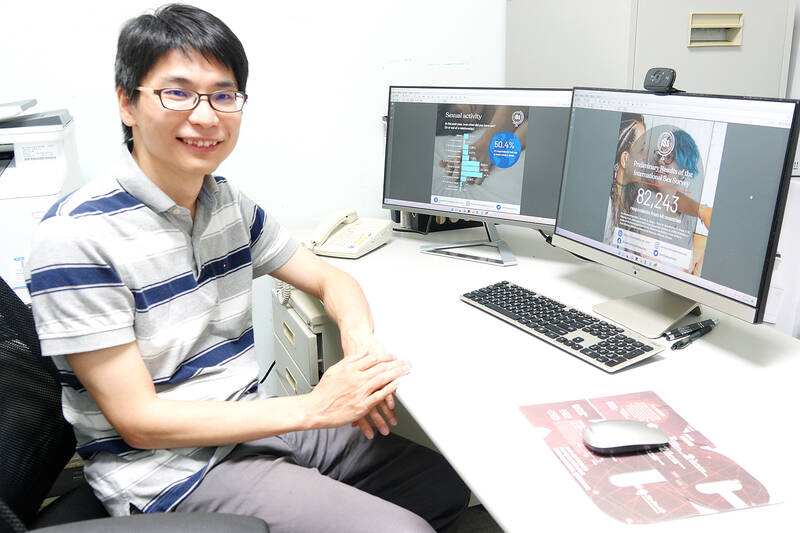Taiwanese on average first use pornographic material at the age of 14, an international survey found on Wednesday.
Researchers at National Cheng Kung University, who conducted the survey in the nation, said 50.2 percent of Taiwanese respondents said they used pornographic material two to three times per month over the past year.
Lin Chung-ying (林宗瑩), an associate professor at the university’s Institute of Allied Health Sciences, said the results indicate that Taiwanese are less sexually active than people in other countries, especially in the West.

Photo provided by National Cheng Kung University
Taiwanese on average masturbate 10 percent less often than respondents from other nations in the survey, Lin said.
The average age Taiwanese have sex for the first time is 21, the survey showed.
Taiwanese who are in a relationship on average have sex two to three time per month, it showed.
A concern in Taiwan is that people start using pornographic materials too early, which might result in them developing unrealistic ideas about sex and might affect their health, Lin said.
The study, conducted from October last year to July, surveyed more than 82,000 respondents in 45 countries.
It surveyed 2,685 Taiwanese aged 18 to 74 from October to December last year.
Although respondents in Taiwan were not randomly sampled and the results might not accurately represent the entire population, Lin said the research still establishes a foundation for future research.

POSITIVE DEVELOPMENT: Japan and the US are expected to hold in-depth discussions on Taiwan-related issues during the meeting next month, Japanese sources said The holding of a Japan-US leaders’ meeting ahead of US President Donald Trump’s visit to China is positive news for Taiwan, former Japan-Taiwan Exchange Association representative Hiroyasu Izumi said yesterday. After the Liberal Democratic Party’s landslide victory in Japan’s House of Representatives election, Japanese Prime Minister Sanae Takaichi is scheduled to visit the US next month, where she is to meet with Trump ahead of the US president’s planned visit to China from March 31 to April 2 for a meeting with Chinese President Xi Jinping (習近平). Japan and the US are expected to hold in-depth discussions on Taiwan-related issues during the

‘LIKE-MINDED PARTNER’: Tako van Popta said it would be inappropriate to delay signing the deal with Taiwan because of China, adding he would promote the issue Canadian senators have stressed Taiwan’s importance for international trade and expressed enthusiasm for ensuring the Taiwan-Canada trade cooperation framework agreement is implemented this year. Representative to Canada Harry Tseng (曾厚仁) in an interview with the Central News Agency (CNA) said he was increasingly uneasy about Ottawa’s delays in signing the agreement, especially as Ottawa has warmed toward Beijing. There are “no negotiations left. Not only [is it] initialed, we have three versions of the text ready: English, French and Mandarin,” Tseng said. “That tells you how close we are to the final signature.” Tseng said that he hoped Canadian Prime Minister Mark Carney

President William Lai (賴清德) yesterday bestowed one of Taiwan’s highest honors on Saint Vincent and the Grenadines (SVG) Ambassador Andrea Clare Bowman in recognition of her contributions to bilateral ties. “By conferring the Order of Brilliant Star with Grand Cordon on Ambassador Bowman today, I want to sincerely thank her, on behalf of the Taiwanese people, for her outstanding contribution to deepening diplomatic ties between Taiwan and SVG,” Lai said at a ceremony held at the Presidential Office in Taipei. He noted that Bowman became SVG’s first ambassador to Taiwan in 2019 and

A man walks past elementary school artworks at the Taipei Lantern Festival in Ximen District yesterday, the first day of the event. The festival is to run from 5pm to 10pm through March 15.